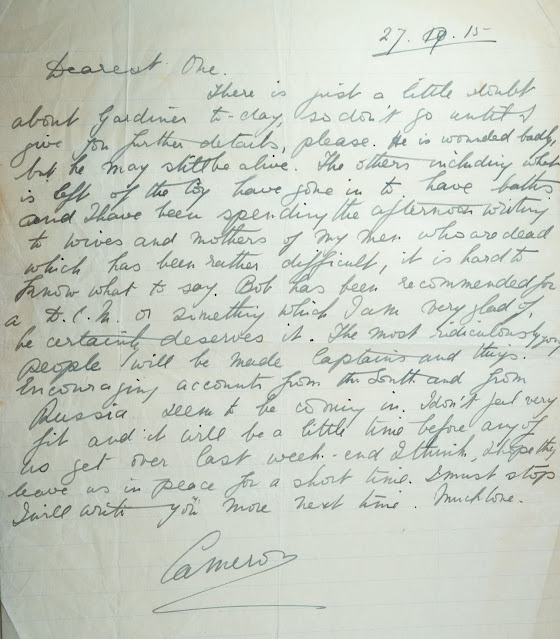Cameron Forster Brown and his letters from the trenches
Cameron Forster Brown (1893-1916) was my grandmother's brother. The two of them were very close.
At the outbreak of WW1, he enlisted in the Cambridgeshire Regiment, obtaining a commission in November 1914 in the 12th Battalion Rifle Brigade.
The 12th battalion was part of 20th Light Division, which on 22 August 1916, relieved 24th Division on the Somme near Delville Wood, after an unsuccessful attack on Guillemont. 20th Division found itself under heavy German attack in horrific conditions as described in The History of the Rifle Brigade in the War of 1914-1918:
"On the night 25/26th, when the Division side-stepped five hundred yards to the right, the Tenth Battalion came into a sector of trenches of a horror that can hardly be imagined. Not merely was the front line impossible to be held: it could only be approached by men of the most iron fortitude. The position was dangerously exposed to fire from the village; but that was nothing. What horrified the senses and shocked the imagination was not what might come from outside the trenches, but what was in them. From end to end they were choked with British dead, on their backs, on their faces, hideously doubled up, distorted with pain, blackened and bloated by the sun, the prey of myriad upon myriad of carrion flies, odiously green with corruption. The Eleventh Battalion on the left were in bad trenches, and were surrounded by many of the worst sights and horrors of war: but to visit the trenches of the Tenth Battalion was, in sober seriousness, like a descent to the anterooms of Hell. Few brigades ever prepared for a great enterprise in less auspicious surroundings and circumstances. The evening attacks continued. The rain poured relentlessly down. The casualties mounted as they had never been known even in the worst days of the Salient. Working parties laboured nightly at digging the jumping-off trenches [in preparation for a fresh attack on Guillemont]. It became doubtful whether the men, on top of such a strain, could undertake what was asked of them".
Cameron sent many letters from the trenches to Doris and Ashley Smith up until his death on 27th August 1916. I have just begun photographing and transcribing the letters and will share progress and notes online here. Together, they form a vivid and personal account of those years.




Comments
Post a Comment